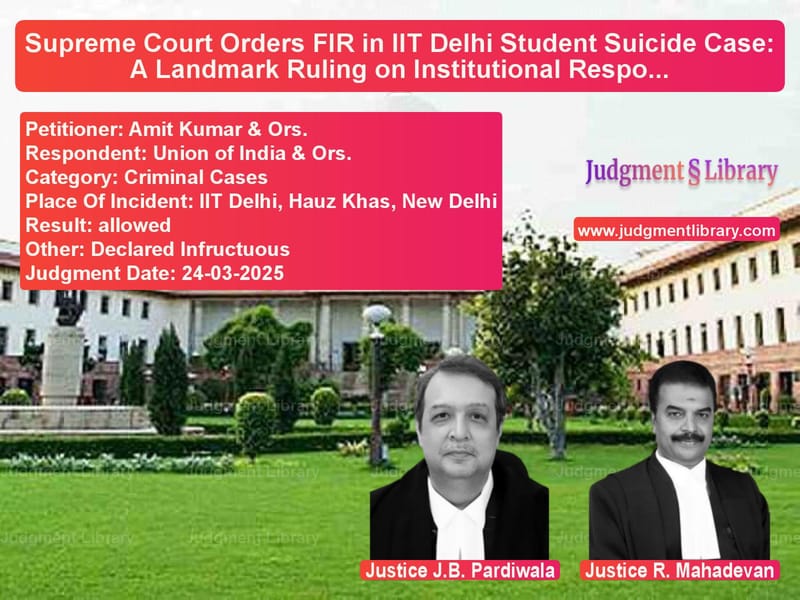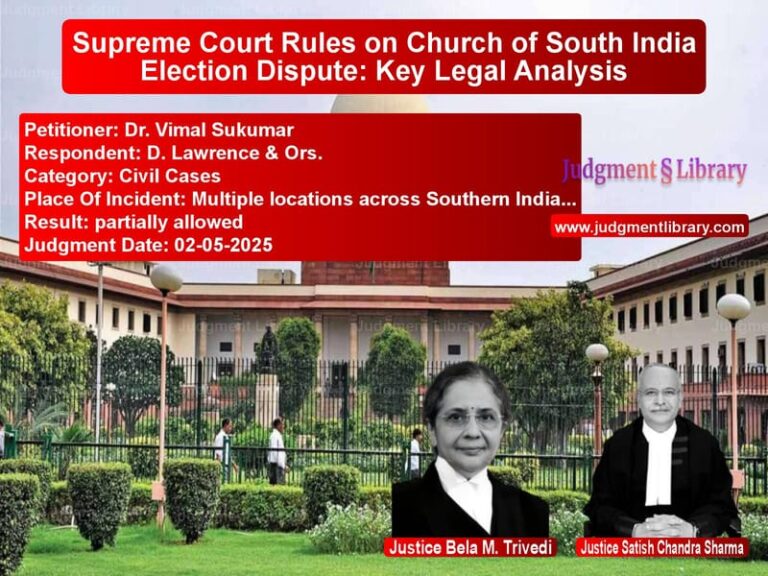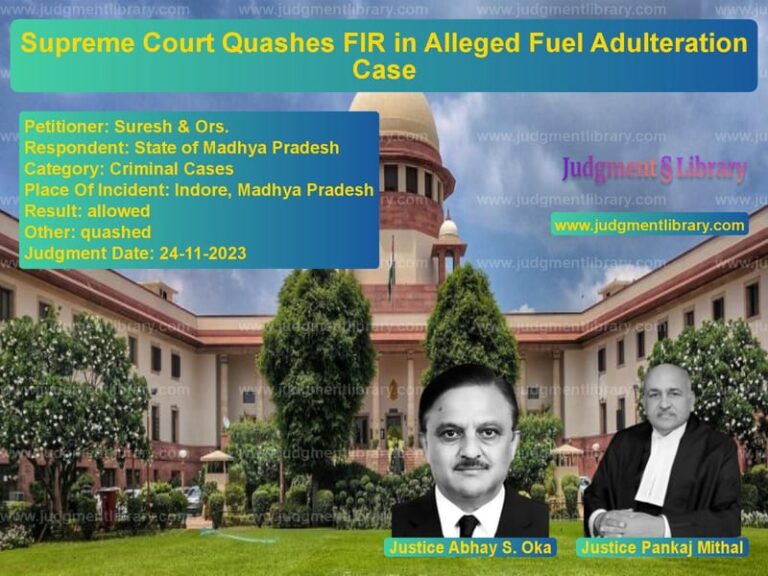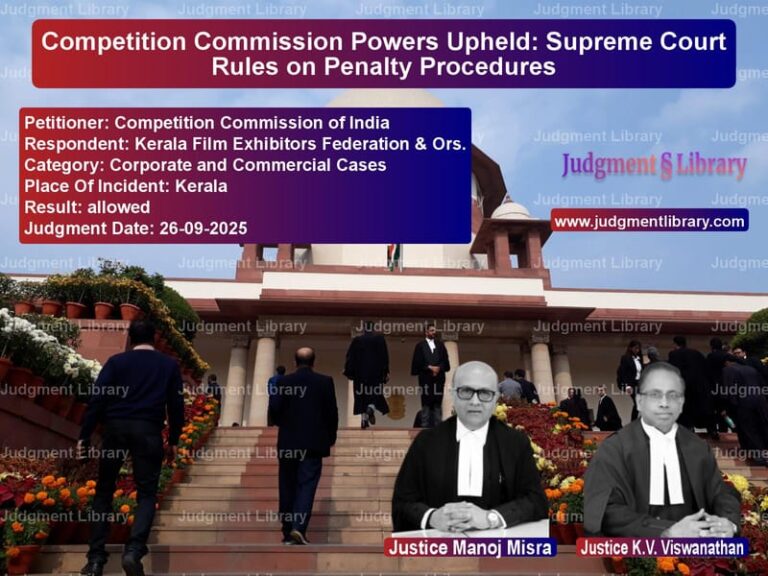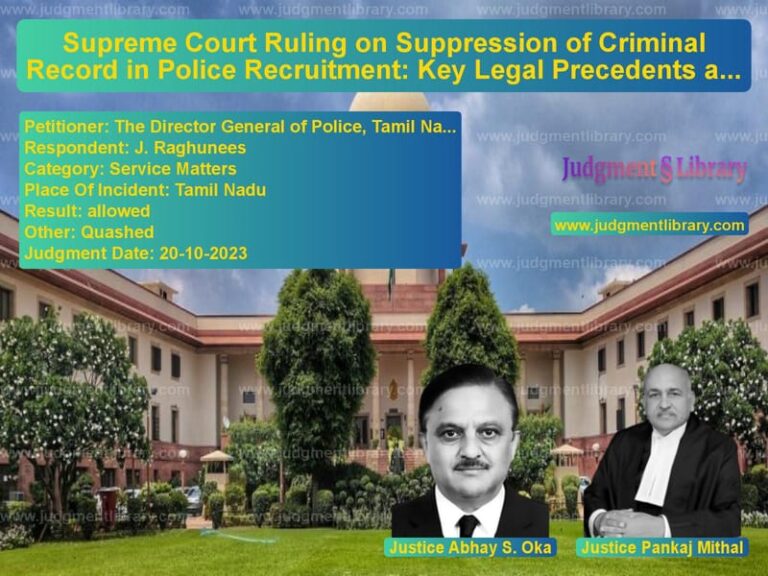Supreme Court Orders FIR in IIT Delhi Student Suicide Case: A Landmark Ruling on Institutional Responsibility
The tragic deaths of two IIT Delhi students, Ayush Ashna and Anil Kumar, sparked nationwide outrage, leading to a crucial legal battle in the Supreme Court of India. The families of the deceased students alleged caste-based discrimination and institutional negligence, demanding the registration of an FIR and a full-fledged investigation.
The Supreme Court, in Amit Kumar & Ors. vs. Union of India & Ors., examined the circumstances surrounding these deaths and delivered a significant judgment emphasizing institutional accountability and the duty of law enforcement agencies in handling such sensitive matters.
Background of the Case
Ayush Ashna, a fourth-year B.Tech student in Mathematics and Computing, was found dead in his hostel room on July 8, 2023. Similarly, Anil Kumar, another B.Tech student, was found dead in his hostel on September 1, 2023. Their families filed complaints alleging that both students were victims of caste-based discrimination by faculty members and peers, leading to their untimely deaths.
Despite these allegations, the Delhi Police refused to register an FIR, citing suicide due to academic pressure. Dissatisfied with the police inquiry, the families approached the Delhi High Court, which dismissed their petition. They then moved to the Supreme Court, seeking justice.
Arguments by the Petitioners
The petitioners, represented by their legal counsel, argued:
- The police failed to register an FIR despite clear allegations of a cognizable offense, violating Section 154 of the CrPC.
- Statements made by the students before their deaths indicated harassment and discrimination, warranting an impartial investigation.
- The Delhi High Court erred in dismissing the writ petition without examining the seriousness of the allegations.
- A fair and independent investigation was necessary to ascertain whether these deaths were suicides or the result of criminal acts.
Arguments by the Respondents
The respondents, including the Delhi Police and IIT Delhi, countered:
- The deaths resulted from academic pressure and poor performance in exams, not discrimination.
- Post-mortem reports confirmed that both students died due to asphyxia caused by hanging, with no signs of foul play.
- Several students from the SC/ST community were interviewed, and none reported discrimination.
- The families’ claims were based on speculation and lacked concrete evidence.
Supreme Court’s Observations and Key Verbatim Excerpts
The Supreme Court bench, led by Justices J.B. Pardiwala and R. Mahadevan, delivered a landmark judgment. The Court emphasized the duty of the police to register an FIR whenever a complaint discloses a cognizable offense.
“The law does not permit the police to refuse the registration of an FIR when allegations prima facie disclose the commission of an offense. In the present case, serious allegations have been made, including caste-based discrimination. An investigation must be conducted to determine the veracity of these claims.”
“We cannot ignore the growing concerns over student suicides in premier institutions. Mental health support and anti-discrimination policies must be strictly enforced.”
Final Judgment
The Supreme Court ruled:
- The police must register an FIR under Sections 302 and 306 IPC (murder and abetment of suicide) and the SC/ST (Prevention of Atrocities) Act.
- An independent investigation must be conducted by the Central Bureau of Investigation (CBI).
- A National Task Force should be constituted to address mental health issues and discrimination in higher educational institutions.
Impact of the Judgment
This ruling reinforces the obligation of institutions and law enforcement agencies to act diligently in cases of student distress. The decision also underscores the need for stringent anti-discrimination policies and better mental health support systems in educational institutions.
With this verdict, the Supreme Court has set a crucial precedent in ensuring justice for marginalized students and holding institutions accountable for their well-being.
Petitioner Name: Amit Kumar & Ors..Respondent Name: Union of India & Ors..Judgment By: Justice J.B. Pardiwala, Justice R. Mahadevan.Place Of Incident: IIT Delhi, Hauz Khas, New Delhi.Judgment Date: 24-03-2025.
Don’t miss out on the full details! Download the complete judgment in PDF format below and gain valuable insights instantly!
Download Judgment: amit-kumar-&-ors.-vs-union-of-india-&-ors-supreme-court-of-india-judgment-dated-24-03-2025.pdf
Directly Download Judgment: Directly download this Judgment
See all petitions in SC/ST Act Case
See all petitions in Suicide Cases
See all petitions in Custodial Deaths and Police Misconduct
See all petitions in Judgment by J.B. Pardiwala
See all petitions in Judgment by R. Mahadevan
See all petitions in allowed
See all petitions in Declared Infructuous
See all petitions in supreme court of India judgments March 2025
See all petitions in 2025 judgments
See all posts in Criminal Cases Category
See all allowed petitions in Criminal Cases Category
See all Dismissed petitions in Criminal Cases Category
See all partially allowed petitions in Criminal Cases Category

